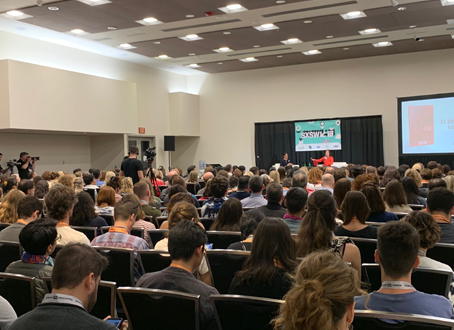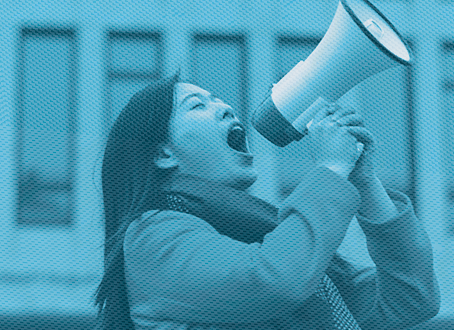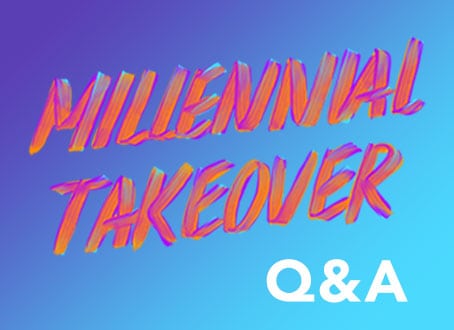This interview is the eighth of nine in a series of Q and A’s with leading changemakers, representing the Millennial generation who are working across sectors to be the force for change on the issues they care about most.
Tell us a little bit about yourself and your work.
My name is Michael Smith. I’m a proud brother, uncle, God parent, partner, son of teen parents from a low-income neighborhood, cross-sector activist from the inside out and Case Foundation alumni. Currently I’m Executive Director of My Brother’s Keeper (MBK) Alliance and Director of Youth Opportunity Programs at the Obama Foundation. I have the privilege to work every day to help build a national movement to ensure nothing stands in the way of boys and young men of color from achieving their dreams.
Prior to the Obama Foundation I had the honor to serve in President Obama’s White House as Special Assistant to the President and Senior Director of Cabinet Affairs for the MBK Initiative. I helped create MBK when I was Director of the Social Innovation Fund at the federal agency that runs AmeriCorps. Before joining the Obama Administration, I spent nearly eight amazing years at the Case Foundation, most recently as SVP of Social Innovation. While there we helped launch a new age of democratized philanthropy, new approaches to civic engagement, international public private partnerships, a national initiative to spark high growth entrepreneurship and the Be Fearless initiative to encourage more innovation and risk taking in the social sector. My colleague Kari Dunn Saratovsky launched our Social Citizen work at that time, which was the beginning of more than 10 years of exciting campaigns and research helping to understand and engage the amazing millennial generation. And just like then, I continue to argue with Kari and others that since I was born in December of ‘79 I’m not really a Millennial! I’m right on the cusp but definitely identify more with the concept of the Oregon Trail generation! Either way, what an exciting time to be part of social change movements when technology, sector conversions, rapid changes in demographics and an ever-shrinking globe is giving us the ability to tackle old challenges in all sorts of new and exciting ways!
What problem keeps you up at night? What do you think it will take to solve it?
Systemic problems require systemic solutions. Innovation and evidence are the gold standard in today’s social sector. They are buzzwords and sacred goals you’ll hear a thousand times at any nonprofit or foundation gathering, and you’ve likely heard both from me ad nauseum over the years as well. We need to focus on both as we work to focus on what’s really working and disrupt the status quo. However, as budgets get smaller, attention spans shorter and challenges larger, I worry that we are focusing more on programs and campaigns that can get people excited for their novelty or are easy to measure in the near term.
The challenges boys and young men of color face in this country, for example, are byproducts of hundreds of years of slavery, systemic racism, white supremacy, Jim Crow, redlining, failing schools and over-policed and underfunded communities. These acts of oppression and hegemony live within every system that poor, black and brown children interact with every day. Solving them requires more than an innovative program that can claim thousands served. It requires an unwavering commitment to balance meeting the serious needs our kids and communities have today, while also having a long-term view and strategies rooted in organizing, power-building, data mining, public-policy review and reform and more. It’s those hard, hard to fund, hard to measure (in the near term) tactics that have led to liberation kept our moral arc bending towards justice.
With technology, there are more opportunities for individuals and communities to share their story and recruit more support for their causes – how do you think that has influenced the way you engage young people in social movements and causes?
The shift in social technology has had seismic effects on the way we learn about and approach solution challenges and solutions—good and bad. I remember in high school history classes learning how television played such a crucial role in the civil rights movement, bringing horrific images of dogs, hoses, burning crosses and police brutality to living rooms across the country and around the world. Today, that power does not just lie with network news or cable TV but with every person who carries a smartphone. With just a couple taps, everyday citizens can now be investigative reporters, philanthropists, organizers, campaign leaders.
While that’s exciting, the proliferation of cellular activists has also created a lot of noise, competition for attention, amplification of hate speech, vast ideological echo chambers or even numbness or callousness as images of atrocious acts show up on a daily basis. My good friend Rashad Robinson, President of Color of Change, talks about the concept that we can’t mistake presence for power. Just because smartphones give everyone presence and access, doesn’t mean everyone has it. Power still comes from the tactics our grandparents used to create the changes we benefit from today…
- Organizing,
- Relationship building,
- Communications,
- Collaboration,
- Goal setting and
- Unyielding focus on success.
When we combine 21st century technology with hundreds of years of lessons on mobilizing for action, that’s when we see true transformation.
What has been your favorite success story?
The work of My Brother’s Keeper has been the most challenging effort I’ve ever been part of but also the most rewarding. I’ve been proud to see the initiative flourish with hundreds of communities responding to President Obama’s call to action, scores of companies making meaningful investments and changing unfair or inequitable practices, and a wide range of federal, state and local policy reforms underway. These programs range from MBK’s Success Mentors that will reach 250,000 6th and 9th graders as part of a sweeping effort to tackle chronic absenteeism, to Second Chance Pell that is providing thousands of incarcerated individuals the opportunity to earn a degree.
What moves me the most is the lives I have seen personally change. We’ve worked with young men through our White House Mentorship and Leadership Program and in MBK Communities who have had the odds stacked against them—youth detention, foster care, failing schools, violent neighborhoods, lack of resources to name a few. But as we approach five years of MBK, those same young men we were supporting in fighting through a tough system are flourishing:
- Derrick just sent me photos with his West Point class.
- Noah and Jerron are about to graduate from Morehouse and Howard. Both have studied abroad, interned on Capitol Hill, become college student leaders and are applying for graduate school.
- Malachi is now a Torch Scholar at Northeastern University, spent the summer in London, is working at nonprofit that focuses on second chances and is on our MBK Alliance Advisory Council.
These young men inspire me and keep me going—not only because of their intelligence and perseverance, but also their commitment to reaching back and creating opportunities for everyone around them.
What is one thing you think everyone should know about your generation?
I’m a cusper—on the line between Generation X and Millennial, and I like to believe that gives me the best traits of both (I love social media and smartphones but am so grateful neither of them was really a thing when I was in school or a young adult)! In addition to the millennial love for new technologies and social media, I think what will be the most impactful for the social sector is our abandonment of traditional social boundaries and concepts. We mix work and play better than most. Our social identities are no longer barred from the workplace and the causes we care about are no longer relegated to an annual check we write or a charity gala. We are all full selves all day, every day, combining the best of who we are—our skills, our friends, our families, our networks – to create change and joy in remarkable ways. We also don’t have any preconceived notions that social change is something that only happens in the nonprofit sector, in schools, or in churches. Millennials are boycotting and buy-cotting, we’re merging business interests with social interests and we’re forcing good to happen wherever we show up—whether that’s school, work, church or even on vacations.
What’s next for you and My Brother’s Keeper Alliance?
MBK Alliance is leading a cross-sector national call to action focused on building safe and supportive communities for boys and young men of color (BYMOC) where they feel valued and have clear pathways to opportunity. With that, we’re working to unleash the power of communities working together to solve problems for BYMOC, at a level to improve real life outcomes. We believe that existing leadership at the local level is powerful enough to address barriers facing BYMOC in communities, but the local ecosystem needs our unique convening power, voice, and support to help activate change.
While we’ll continue to advance cradle to career milestones and building collective impact infrastructure that leads to lasting results, our team will also primarily work with MBK Communities to prioritize solutions in two specific areas: youth violence prevention, and growing the mentor pipeline for evidence-based mentorship programs for BYMOC.
How can people interested in your cause learn more?
obama.org/mbka @MBK_Alliance 
 We will be featuring interviews from each of the leaders representing the Millennial generation on key movements and issues today who participated in our recent 10-day Instagram takeover. Stay tuned for the rest of this series and see their stories as part of an infographic detailing ten key traits about how Millennials engage with causes, based on our ten years of research, here.





